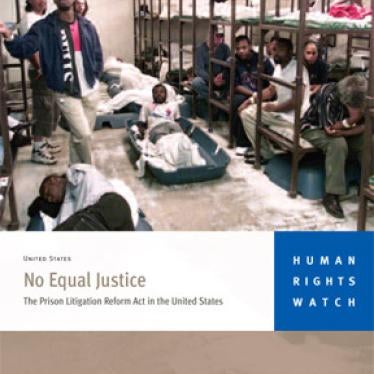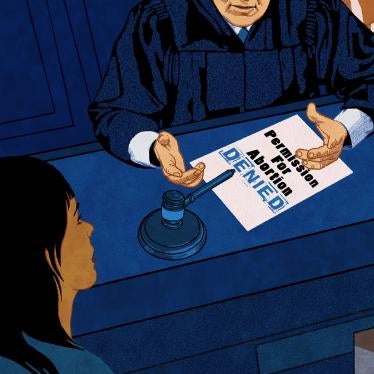Susan Hillenbrand
Standards Committee Project Director
ABA Criminal Justice Section
Washington, DC 20005
RE: Human Rights Watch supports proposed ABA Standards on the Treatment of Prisoners
Dear Ms. Hillenbrand:
I am writing to express Human Rights Watch's strong support for the proposed ABA Standards on the Treatment of Prisoners, and to urge their approval by the Criminal Justice Section Council at its August 1-2, 2009 meeting.
Human Rights Watch is a nongovernmental organization established in 1978 to monitor and promote observance of internationally recognized human rights. It has Special Consultative Status at the United Nations, regularly reports on human rights conditions in the United States and more than seventy other countries around the world, and actively promotes legislation and policies worldwide that advance protections of domestic and international human rights and humanitarian law.
Human Rights Watch has been researching and reporting on the treatment of prisoners in the United States for nearly twenty years. Our work has covered a broad range of issues, including sexual abuse of prisoners, use of force, prisoners with mental illness, "supermax" or isolated confinement, prison discipline, substance abuse treatment, grievance systems, and prisoners' access to the courts. A list of Human Rights Watch reports dealing with US prison and jail conditions is appended to this letter.
We have carefully reviewed the proposed Standards on the Treatment of Prisoners, and believe that their implementation would advance the protection of internationally recognized human rights in US prisons and jails. It would also bring the United States closer to compliance with its obligations under human rights treaties it has ratified, including the Convention Against Torture and Other Cruel, Inhuman or Degrading Treatment or Punishment and the International Covenant on Civil and Political Rights.
Reflecting the role of both prisoners' advocates and correctional officials in their formulation, the Standards would help ensure respect for the rights of prisoners while meeting the needs of institutional order and security. There are no dramatic breaks with current correctional practice; indeed, it is our experience that many of the Standards reflect policies and practices that have been in place for years in well-run prisons and jails. The Standards are carefully crafted, balanced, and eminently workable.
Human Rights Watch endorses the Standards in their entirety. However, we wish to draw particular attention to an issue of overarching importance: the need for amendment of the Prison Litigation Reform Act (PLRA). Enacted in 1996, the PLRA singles out lawsuits brought by prisoners for a host of burdens and restrictions that apply to no other litigants. As documented in our recent report, No Equal Justice: The Prison Litigation Reform Act in the United States (2009), the PLRA has resulted in dismissal of prisoner lawsuits seeking protection from dangerous conditions of confinement as well as cases seeking redress for sexual abuse and other serious injuries suffered by prisoners. It has significantly limited the ability of the federal courts to enforce minimal standards of safety and humane treatment in US prisons, jails, and juvenile facilities.
Human Rights Watch is not aware of any other country in which national legislation singles out prisoners for a unique set of barriers and obstacles to vindicating their legal rights in court. Amendment of the PLRA is essential to restoring the rule of law to US correctional institutions. The ABA has already endorsed amendment of the PLRA in several respects (see Report No. 102B, February 2007); the proposed Standards do the same (see Standards 23-9.2(d), 23-9.3(c), and 23-9.4(e)).
The new Standards regarding segregation and isolated confinement are also critically important. Since the last version of the Standards was promulgated in 1981, the United States has seen a substantial increase in the use of long-term isolated confinement, with the proliferation of "supermax" prisons and units in the 1990s. This development has been noted with concern by the Committee against Torture, the monitoring body for the Convention Against Torture and Other Cruel, Inhuman or Degrading Treatment or Punishment, a treaty ratified by the United States in 1994. In its 2006 report on the United States, the Committee said the following:
The Committee remains concerned about the extremely harsh regime imposed on detainees in "supermaximum prisons." The Committee is concerned about the prolonged isolation periods detainees are subjected to, the effect such treatment has on their mental health, and that its purpose may be retribution, in which case it would constitute cruel, inhuman or degrading treatment or punishment.
Conclusions and recommendations of the Committee against Torture, United States of America, CAT/C/USA/CO/2, 18 May 2006, paragraph 36.[1]
At the same time, a growing body of research has documented the profoundly damaging effects that isolated confinement can have on some prisoners, particularly those suffering from serious mental illness. Accordingly, federal courts, as well as legislatures and prison administrators, have insisted on safeguards to ensure that vulnerable prisoners are excluded from supermax confinement, and that other prisoners are carefully monitored for deterioration in their mental health. For example, Wisconsin has barred prisoners with serious mental illness from its supermax facility since 2001. Standards 23-2.8 and 23-6.11 implement this workable and common-sense policy.
In addition, in light of the extraordinarily harsh nature of supermax confinement, the Supreme Court has held that prisoners have a protected liberty interest in avoiding transfer to a supermax facility, and that basic procedural safeguards must accompany any such transfer decision. Wilkinson v. Austin, 545 U.S. 209 (2005). The Standards set forth appropriate procedural protections, and also set forth presumptive limits on the use of this extreme form of confinement. See Standards 23-2.6, 23-2.7, and 23-2.9.
Proposed Revisions
While endorsing the Standards in their present form, Human Rights Watch proposes the following modifications:
Standard 23-2.8, Segregated housing and mental health
As discussed above, this standard appropriately provides that a prisoner with "serious mental illness" should be housed in "an environment where appropriate treatment can occur." Standard 23-6.11(d) similarly provides that "Prisoners diagnosed with serious mental illness should not be housed in settings that may exacerbate their mental illness or suicide risk, particularly in settings involving sensory deprivation or isolation."
However, the term "serious mental illness" is not defined in the Standards. Courts considering Eighth Amendment challenges to conditions in supermax facilities have formulated definitions of "serious mental illness" for the purpose of excluding such persons from isolated confinement. See, e.g., Fathi, "The Common Law of Supermax Litigation," 24 Pace L. Rev. 675 (2004) (collecting definitions). One or more of these definitions should be included in the Standards.
Standard 23-3.1, Physical plant and environmental conditions
Subsection (a)(iv) of this Standard requires "appropriate heating and ventilation systems." In recent years, there has been increasing awareness of the sometimes lethal risk posed by heat injury in correctional facilities. See, e.g., Gates v. Cook, 376 F.3d 323, 339 (5th Cir. 2004) (citing expert testimony that it was "very likely" that Mississippi death row prisoners would die of heat-related illness). Accordingly, this Standard should be modified to require "appropriate heating, cooling, and ventilation systems."
Standard 23-4.2, Disciplinary hearing procedures
Standard 23-4.2(d) provides that "a prisoner should be found to have committed [an] offense only after an individualized determination, by a preponderance of the evidence[.]" However, some prison systems have at times imposed a form of collective guilt, presuming that all prisoners sharing a given cell are responsible for any rule violation that takes place in the cell. See, e.g., Petition of Anderson,112 Wash.2d 546, 548, 772 P.2d 510, 511 (1989) (upholding disciplinary conviction based on regulation providing that "Each inmate of a multiple-inmate cell will be held accountable for an infraction that occurs within the confines of such cell unless he/she can establish a lack of involvement in the infraction"). The Standard should be revised to clearly state that such collective punishment, without evidence of individual culpability, is not permitted.
Standard 23-6.1, General principles governing health care
This standard provides in subsection (b) that "Prisoners need not be provided elective care." Characterization of a procedure as "elective" is not determinative of correctional officials' obligation to provide it, and therefore the term seems to serve little useful purpose. See, e.g., Johnson v. Bowers, 884 F.2d 1053, 1056 (8th Cir. 1989) ("The hospital's gratuitous classification of Johnson's surgery as ‘elective,' however, does not abrogate the prison's duty, or power, to promptly provide necessary medical treatment for prisoners"); Monmouth County Correctional Institutional Inmates v. Lanzaro, 834 F.2d 326, 349 (3d Cir. 1987) (characterization of procedure as "elective" is "of little or no consequence in the context of the Estelle ‘serious medical needs' formulation"). This portion of subsection (b) should be deleted; the balance, which provides that prisoners "should not be charged fees for necessary health care," should be retained.
Standard 23-7.2, Treatment of prisoners with disabilities and other special requirements
This Standard requires that, under specified circumstances, prisoners with speech or hearing impairments be provided with "qualified sign language interpretation" (subsection (e)(1)), and that those who do not speak or understand English be provided with "necessary interpretive services" (subsection (f)(iii)). The Standard should be amended to clarify that use of prisoners as interpreters is not acceptable. See Bonner v. Lewis, 857 F.2d 559, 561 (9th Cir. 1988) (noting that "use of inmate interpreters raises serious confidentiality concerns").
* * *
The ABA's approval of the Standards would represent a significant contribution to the improvement of American corrections, and to the safe, fair, and humane operation of US prisons and jails. Human Rights Watch strongly supports the Standards, and urges the Criminal Justice Section Council to approve them.
Very truly yours,
David C. Fathi
Director, US Program
[1] On supermax and isolated confinement, see the following Human Rights Watch reports: Ill-Equipped: US Prisons and Offenders with Mental Illness (2003); Out of Sight: Super-Maximum Security Confinement in the US (2000); Red Onion State Prison: Super-Maximum Security Confinement in Virginia (1999); Cold Storage: Super-Maximum Security Confinement in Indiana (1997).
Appendix: Human Rights Watch Reports
On US Prisons and Jails
No Equal Justice: The Prison Litigation Reform Act in the United States (2009)
Barred from Treatment: Punishment of Drug Users in New York State Prisons (2009)
Cruel and Degrading: The Use of Dogs for Cell Extractions in U.S. Prisons (2006)
Ill-Equipped: U.S. Prisons and Offenders with Mental Illness (2003)
Incarcerated America (2003)
Race and Incarceration in the United States (2002)
No Escape: Male Rape in U.S. Prisons (2001)
Out of Sight: Super-Maximum Security Confinement in the US (2000)
Human Rights Watch Statement to the Virginia Crime Commission: Supermaximum Security (1999)
No Minor Matter: Children in Maryland's Jails (1999)
Red Onion State Prison: Super-Maximum Security Confinement in Virginia (1999)
Nowhere to Hide: Retaliation Against Women in Michigan State Prisons (1998)
Locked Away: Immigrant Detainees in Jails in the United States (1998)
High Country Lockup: Children in Confinement in Colorado (1997)
Cold Storage: Super-Maximum Security Confinement in Indiana (1997)
All too Familiar: Sexual Abuse of Women in U.S. State Prisons (1996)
Modern Capital of Human Rights? Abuses in the State of Georgia (1996)
Children in Confinement in Louisiana (1995)
Human Rights Violations in the U.S. A Report on U.S. Compliance with the
International Covenant on Civil and Political Rights (1994)
The Human Rights Watch Global Report on Prisons (1993)
Prison Conditions in the United States (1991)
Prison Conditions in Puerto Rico (1991)







